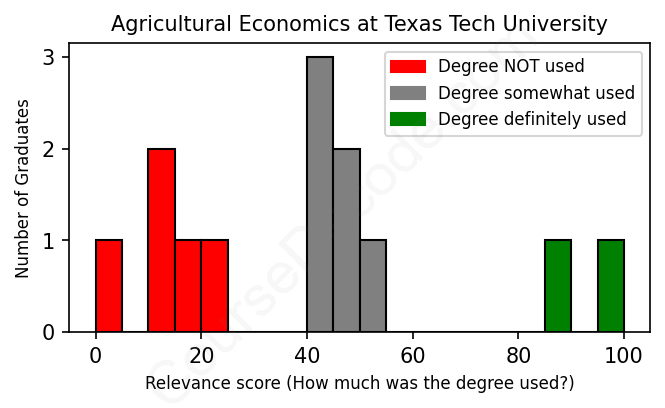
First, some facts. Of the Agricultural Economics graduates from Texas Tech University we've analyzed , here's how many have used (or NOT used) their degree in their career:

These are estimates based on AI analysis of 13 LinkedIn profiles (see below).
The verdict? Bad. Overall, with an average relevance score of 39%, Agricultural Economics graduates from Texas Tech University have a substantially lower likelihood (-28%) of finding work in this field compared to the average graduate across all fields:
And for comparison, here's the chart for all profiles we've looked at across all degrees.
Also, after graduating, only 15% of these graduates have pursued further education other than another Bachelor's degree (such as a Masters degree or other), compared to the average across all profiles of 35%. This suggests a Bachelors degree is enough for most Agricultural Economics graduates, and it's normal to look for work straight after graduation.
See the details:
|
Relevance score: 43% We think this person has gone into a career only somewhat relevant to their degree. We think this person has gone into a career only somewhat relevant to their degree.
DEGREE INFOGraduated in 2015 from Texas Tech University with a Bachelor of Science (B.S.) in Agricultural Economics. No other secondary education since. JOB HISTORY SINCE GRADUATIONLogistics Manager Cape and Son Merchandising Jun 2015 - Sep 2015 Customer Service Representative  Bank of America Nov 2015 - Dec 2016 Financial Aid Receptionist  Hardin-Simmons University Jan 2017 - Sep 2017 Relationship Manager  TD Ameritrade Jan 2018 - Jul 2018 Relationship Manager II  TD Ameritrade Jul 2018 - Jun 2020 Sr. Relationship Manager  TD Ameritrade Jun 2020 - Oct 2022 Manager, WMS Advisor Relations  TD Ameritrade Oct 2021 - Oct 2022 Sr. Manager, Operations  TD Ameritrade Oct 2022 - Feb 2023 Sr Manager, Operations  Charles Schwab Feb 2023 - Present ABOUTI am a people-oriented and task-driven individual with a desire to motivate a team. I thrive in opportunities where I can leverage my organizational strengths, while cultivating relationships in a dynamic working environment. |
The top 10 most common jobs done by the graduates we've analyzed (ranked most common to least) are:
Looking at the various jobs held by graduates of Agricultural Economics from Texas Tech University, it’s clear that a mix of roles are represented across different industries. Many have found their way into positions that involve some level of financial or operations management, like loan officers, project coordinators, and various sales roles. While some of these jobs, such as the Agronomist or Research Manager positions, are a perfect fit for someone with an Agricultural Economics background, others are a bit of a stretch. For instance, positions like Customer Service Representative or Operations Manager at retail companies seem to focus more on general management or customer interactions, which don't directly tap into the specific skills learned in Agricultural Economics.
In general, it appears that many graduates are working in jobs that don't directly utilize their academic expertise on a day-to-day basis. While some roles here and there definitely make use of economic concepts or agricultural principles, the overall trend shows that a significant number of graduates have moved into areas that aren't deeply rooted in their degree's core teachings. So, while the degree might provide some helpful insight or perspective in these varied roles, it's not always the primary tool they use on the job. Essentially, there's a blend of relevant and tangential roles, demonstrating that, while the degree opens doors, the path taken can diverge significantly from traditional agricultural economics pathways.
Here is a visual representation of the most common words in job titles for Agricultural Economics graduates (this is across all Agricultural Economics graduates we've analyzed, not just those who went to Texas Tech University):

When looking at the career trajectories of Texas Tech University graduates with a degree in Agricultural Economics, it seems there’s a mixed bag of outcomes. Many graduates land jobs that are somewhat related to their field, especially in areas like sales, operations, and finance. For instance, those graduating around 2010 often started with roles in lending or operations in agricultural firms, which makes sense given their background. Fast forward five years, and many still find themselves climbing the ladder in related industries like finance and agribusiness, suggesting that the degree does provide a solid foundation for advancing in these sectors.
However, there are definitely cases where graduates drift away from agriculture-focused jobs. Some find themselves in unrelated fields like logistics, teaching, or finance, which might indicate that either they’re seeking broader career opportunities or the job market didn’t align with their initial goals. By the ten-year mark, quite a few seem to have stabilized into managerial or specialized roles in larger companies, which is encouraging to see. Overall, while some graduates stick closely to agricultural economics, others branch out and find success in various fields, showcasing a level of versatility for those pursuing this degree.
Getting a Bachelor’s degree in Agricultural Economics at Texas Tech University can be challenging, but it really depends on your interests and strengths. Overall, it's about average in terms of difficulty compared to other majors. You’ll definitely deal with a mix of economics, math, and agriculture-related topics, which can be a bit tough if you’re not into numbers or analytical thinking. However, if you have a genuine interest in those areas, you might find it rewarding and manageable. Plus, the support from professors and resources at Texas Tech can help you through the tougher spots. So, while it has its challenges, with the right mindset and effort, it’s totally doable!
Most commonly, in the LinkedIn profiles we've looked at, it takes people 3 years to finish a Bachelor degree in Agricultural Economics.
Looking at these Texas Tech Ag Economics graduates, it seems like many of them have carved out some pretty solid careers, especially those who’ve moved into management and sales roles. The VP at AgTexas Farm Credit, for example, likely earns a good salary considering the seniority of that position. Others have progressed through various sales and managerial positions at Ferguson and TD Ameritrade, which usually come with decent compensation. It’s a mixed bag, though; some started with more modest roles, like administrative positions or tech support, but they seem to have moved up the ladder over time. On the whole, it looks like most of these folks are doing well financially, especially those who stuck with their careers in logistics, finance, and management.
Here is a visual representation of the most common words seen in the "about" section of LinkedIn profiles who have a Bachelor degree in Agricultural Economics (this is across all Agricultural Economics graduates we've analyzed, not just those who went to Texas Tech University). This may or may not be useful:

Here are all colleges offering a Bachelor degree in Agricultural Economics (ordered by the average relevance score of their Agricultural Economics graduates, best to worst) where we have analyzed at least 10 of their graduates:
| College | Score | Count |
|---|---|---|
 Texas A&M University Texas A&M University
|
42 | 31 |
 Texas Tech University Texas Tech University
|
39 | 13 |